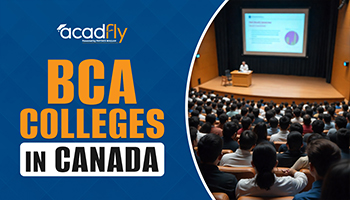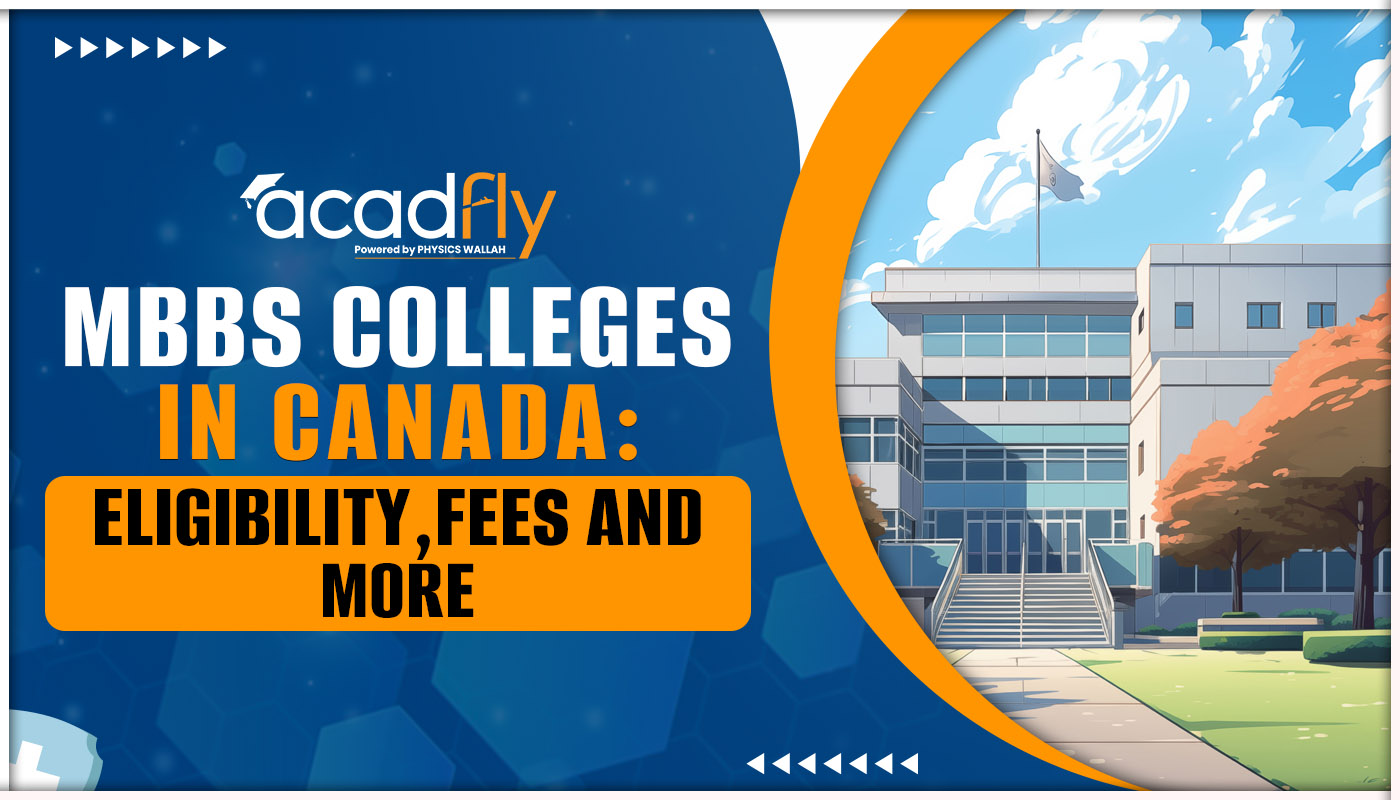

Entrance Exams for MBBS Abroad: Pursuing an MBBS degree abroad is an attractive option for many students due to the global exposure, advanced medical facilities, and diverse learning experiences it offers. However, to study MBBS abroad, students must navigate a variety of entrance exams specific to the countries and universities they aim to attend.
This comprehensive guide will provide detailed information on the entrance exams for MBBS abroad, including their formats, eligibility criteria, and preparation tips. Whether you plan to study medicine abroad in countries like the USA, UK, Australia, or others, understanding these entrance exams is crucial for a successful application process. Additionally, we will discuss how AcadFly can support your preparation journey.
Entrance Exams for MBBS Abroad
Entrance exams for MBBS abroad vary by country and institution. These exams assess a student's knowledge in subjects like biology, chemistry, and physics, as well as their proficiency in English. Some of the most common MBBS abroad entrance exams include the Medical College Admission Test (MCAT), United Kingdom Clinical Aptitude Test (UCAT), and the National Eligibility cum Entrance Test (NEET) for students aspiring to study in India but seeking equivalence abroad.
Common Entrance Exams for MBBS Abroad
Common entrance exams for MBBS abroad include the MCAT for the USA and Canada, the UCAT for the UK, Australia, and New Zealand, and the NEET for global equivalence. These exams assess various skills essential for medical studies.
|
Common Entrance Exams for MBBS Abroad |
|||
|
Exam Name |
Countries/Regions |
Key Subjects Covered |
Exam Format |
|
MCAT |
USA, Canada |
Biology, Chemistry, Physics |
Multiple-choice questions, essays |
|
UCAT |
UK, Australia, New Zealand |
Verbal Reasoning, Decision Making, Quantitative Reasoning, Abstract Reasoning, Situational Judgment |
Computer-based test |
|
NEET |
India, Global Equivalence |
Biology, Chemistry, Physics |
Multiple-choice questions |
|
BMAT |
UK, Singapore |
Aptitude, Skills, Science |
Multiple-choice questions, essays |
|
IMAT |
Italy |
Logical Reasoning, General Knowledge, Biology, Chemistry, Physics, Mathematics |
Multiple-choice questions |
Key Entrance Exams for MBBS Abroad
Medical College Admission Test (MCAT)
The MCAT is a standardized test required for admission to most medical schools in the USA and Canada. It assesses problem-solving, critical thinking, and knowledge of natural, behavioral, and social science concepts.
-
Eligibility: Typically, students must have completed undergraduate coursework in biology, chemistry, and physics.
-
Exam Format: The MCAT consists of multiple-choice questions in four sections: Biological and Biochemical Foundations of Living Systems, Chemical and Physical Foundations of Biological Systems, Psychological, Social, and Biological Foundations of Behavior, and Critical Analysis and Reasoning Skills.
United Kingdom Clinical Aptitude Test (UCAT)
The UCAT is used by medical schools in the UK, Australia, and New Zealand to assess applicants' mental abilities, attitudes, and professional behaviors required for a medical career.
-
Eligibility: High school graduates or equivalent.
-
Exam Format: The UCAT is a computer-based test with five sections: Verbal Reasoning, Decision Making, Quantitative Reasoning, Abstract Reasoning, and Situational Judgment.
National Eligibility cum Entrance Test (NEET)
NEET is the entrance exam for MBBS and other medical courses in India, but its scores are also accepted by some universities abroad for equivalence.
-
Eligibility: High school graduates with biology, chemistry, and physics.
-
Exam Format: NEET consists of multiple-choice questions in three sections: Physics, Chemistry, and Biology.
BioMedical Admissions Test (BMAT)
The BMAT is used by medical schools in the UK and Singapore to assess candidates' scientific and mathematical knowledge, as well as their problem-solving and critical thinking skills.
-
Eligibility: High school graduates or equivalent.
-
Exam Format: The BMAT consists of three sections: Aptitude and Skills, Scientific Knowledge and Applications, and Writing Task.
International Medical Admissions Test (IMAT)
The IMAT is used by medical schools in Italy to assess candidates' knowledge in logical reasoning, general knowledge, and scientific subjects.
-
Eligibility: High school graduates or equivalent.
-
Exam Format: The IMAT consists of multiple-choice questions in Logical Reasoning, General Knowledge, Biology, Chemistry, Physics, and Mathematics.
Preparing for Entrance Exams for MBBS Abroad
Assess Your Starting Point
Before beginning your preparation, take a diagnostic test for the entrance exam you plan to take. This will help you identify your strengths and weaknesses and set a realistic target score.
Set Realistic Goals
Based on your diagnostic test results, set a target score that aligns with the requirements of your target medical schools. Research the average scores for admitted students to these programs and use this information to set your goals.
Create a Study Schedule
A well-structured study schedule is crucial for effective preparation. Allocate specific time slots for each subject, ensuring a balanced approach. Include regular practice sessions, review periods, and breaks to avoid burnout.
Study Schedule for MBBS Abroad Entrance Exams
Entrance exams for MBBS abroad, such as MCAT, UCAT, NEET, BMAT, and IMAT, are crucial for gaining admission to medical schools. These exams test candidates' knowledge, reasoning skills, and aptitude for medical education.
|
Study Schedule for MBBS Abroad Entrance Exams |
||||
|
Week |
Biology Focus |
Chemistry Focus |
Physics Focus |
Practice Tests |
|
1 |
Cell Structure, Genetics |
Atomic Structure, Bonding |
Mechanics, Kinematics |
Diagnostic Test |
|
2 |
Human Physiology |
Organic Chemistry |
Thermodynamics |
Practice Test 1 |
|
3 |
Ecology, Evolution |
Inorganic Chemistry |
Electromagnetism |
Review and Revise |
|
4 |
Microbiology, Immunology |
Chemical Reactions |
Waves, Optics |
Practice Test 2 |
Utilizing Preparation Resources For MBBS Abroad
Books and Study Guides
Invest in high-quality preparation books and study guides for your specific entrance exam. These resources provide comprehensive coverage of the exam content, practice questions, and test-taking strategies.
Online Courses and Tutorials
Enroll in online preparation courses and tutorials. Platforms like AcadFly offer personalized study plans, expert tutoring, and extensive practice materials to help you prepare effectively.
Practice Tests and Question Banks
Regularly take full-length practice tests to simulate the actual exam experience. Use question banks to access a wide range of practice questions and review detailed explanations for each answer.
Test Day Strategies for Entrance Exams
Arrive Early and Prepared
Arrive at the test center early with all necessary documents, including your identification and admission ticket. Being well-prepared will help reduce test-day anxiety.
Read Instructions Carefully
Take your time to read the instructions for each section carefully. Ensure you understand what is required before starting each task.
Manage Your Time
Keep track of the time allocated for each section and pace yourself accordingly. Avoid spending too much time on any single question.
Stay Calm and Focused
Maintain a calm and focused mindset throughout the exam. If you encounter difficult questions, take a deep breath, and move on to the next one. You can always return to challenging questions if time permits.
How AcadFly Can Help with Entrance Exam Preparation?
AcadFly provides comprehensive support for students preparing for MBBS entrance exams abroad. Here’s how AcadFly can assist you:
Customized Study Plans
AcadFly offers personalized study plans tailored to your strengths and weaknesses, ensuring efficient and effective preparation.
Expert Tutoring
AcadFly’s experienced tutors provide one-on-one coaching, helping you understand complex concepts and develop test-taking strategies.
Extensive Practice Materials
AcadFly offers a wide range of practice materials, including mock tests, practice questions, and interactive exercises, simulating the actual exam environment.
Regular Progress Tracking
AcadFly tracks your progress regularly, providing detailed feedback and suggestions for improvement, keeping you on track to achieve your target score.
Conclusion
Preparing for entrance exams for MBBS abroad requires a structured approach, effective study techniques, and the use of high-quality resources. By understanding the exam structure, creating a comprehensive study plan, utilizing various preparation resources, and implementing test-day strategies, you can achieve a good score on your entrance exams. For personalized guidance and comprehensive support in your preparation journey, AcadFly offers expert assistance to help you achieve your academic and professional goals. Leveraging these resources and strategies will help you confidently approach your entrance exams and succeed in your medical school applications.
Frequently Asked Questions
1. What are the common entrance exams for MBBS abroad?
2. How do I create an effective study plan for MBBS abroad entrance exams?
3. What resources are best for MBBS abroad entrance exam preparation?
4. What are some tips for managing time during entrance exams for MBBS abroad?
5. How can AcadFly assist with entrance exam preparation for MBBS abroad?









